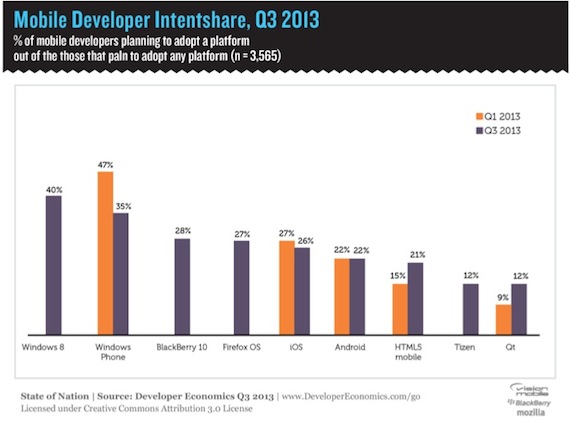Ever since the introduction of the App Store, applications (and by extension, developers) have been key to the success of any mobile platform. While iOS and Android are home to large developer communities, Microsoft’s Windows Phone platform is still struggling. According to new data, that doesn’t look like it’s going to change any time soon.
Vision Mobile’s new State of the Mobile nation study shows that the current state of the mobile development ecosystem is fairly stable. The results show Android in the lead in terms of market share, iOS most profitable for developers, and Windows Phone still waiting for acceptance.
The numbers are, for the most part, unsurprising. Android, the current leader in smartphone market share, has garnered the most developer attention, with 71 percent of mobile developers working on the platform. 57 percent are working on iOS. A scant 21% of developers are working on Windows Phone.
While most developers have a presence on Android, 59 percent of iOS developers say that Apple’s ecosystem is their primary platform, while only 49.4 percent of Android devs say the same thing.
One of the reasons that may explain why Apple’s platform is primary for so many is its profitability. According to the study, iOS apps earn an average of $5200 dollars a month for their developers, 10 percent more than their Android counterparts.
But because Android is the leading platform in terms of market share, developers who need their application to reach a broad audience have to work with it, even if their primary focus is on iOS.
While 47 percent of developers in the first quarter of 2013 intended to adopt Windows Phone, that number has shrunk to 35 percent in Q3. What’s more, the percentage of developers actually working on Windows Phone hasn’t moved at all, which probably means that some of the developers who intended to adopt WP8 didn’t, and the number of those that did wasn’t great enough to increase the number of WP8 developers by even one percent. While numbers of developers alone can’t be reflective of a platform’s quality, it isn’t a great sign for the folks in Redmond.
If Microsoft is going to pick up new developers, they’re going to have to do something different. Vision Mobile offers this by way of advice:
Instead of competing directly with the Apple/Google duopoly, a far more effective strategy is to follow the recipe that brought down the pre-iPhone industry and installed iOS and Android at the top of the app economy: not direct, but asymmetric competition. It will take a fundamental change in the basis of competition to uproot either of these platforms from their positions.
Previously on GeekWire: New data: Samsung gaining ground on Apple in smartphone market share






